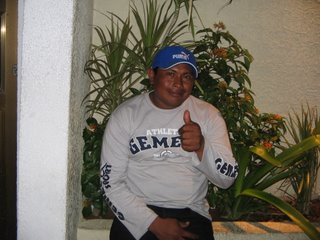Friday, September 29, 2006
Vaso Gigante, Murcielagos, Futbol, Licensiadura, Soya, Saradillos
 The Hospital Universitario is filled with top notch doctors who are real experts in their field. However, there is no toilet paper in the bathrooms and the air conditioning only works in certain sections at certain times of the day. This picture was taken in an abandoned corridor on the 7th floor. Four bats can be seen - 2 hanging from the concrete ceiling and two in flight.
The Hospital Universitario is filled with top notch doctors who are real experts in their field. However, there is no toilet paper in the bathrooms and the air conditioning only works in certain sections at certain times of the day. This picture was taken in an abandoned corridor on the 7th floor. Four bats can be seen - 2 hanging from the concrete ceiling and two in flight. This is a photo taken in front of the house of the Peruvians with whom I have been living. It had rained, and of course the power was out, so I went outside for a respite from the stale indoor heat. These boys were playing soccer barefoot in the street. They ranged in age from 12-18. The guy in the blue shirt to the far left plays on a semi-pro team and can change direction five times in five seconds. The nets, which get run over by cars on a regular basis, kept collapsing, so the players would add more bricks to the base for support. I like this photo because it also shows the flooding that happens on these poorly draining streets in a rainstorm. The puddles immediately get filled up with mosquito larvae which attract dragonflies, and in turn attract me to watch the dragonflies hunt.
This is a photo taken in front of the house of the Peruvians with whom I have been living. It had rained, and of course the power was out, so I went outside for a respite from the stale indoor heat. These boys were playing soccer barefoot in the street. They ranged in age from 12-18. The guy in the blue shirt to the far left plays on a semi-pro team and can change direction five times in five seconds. The nets, which get run over by cars on a regular basis, kept collapsing, so the players would add more bricks to the base for support. I like this photo because it also shows the flooding that happens on these poorly draining streets in a rainstorm. The puddles immediately get filled up with mosquito larvae which attract dragonflies, and in turn attract me to watch the dragonflies hunt.
Here I am at a more professional soccer venue. The photo below was taken in Pachencho Romero stadium. Tickets are free as the park is sponsored by Pepsi and the local government. Games start at 5:00 or 5:30 so that at least some portion of the game can be played in twilight, without the presence of the brutally powerful sun. In this game, the Sports Club of Maracaibo took on the Guayana Miners. Maracaibo dominated with a final score of 2-0. The language used by the fans is one of the majors draws of the games. The most urbane fans yell, "Hey ref, you're a dick." Those in the lower classes enumerate sex acts performed by members of the opposite team and launch bottle rockets onto the field.
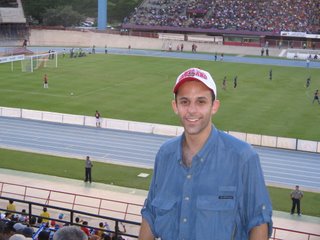 This is another picture taken at Pachencho Romero stadium. These kids showed up midway through the 1st half with an impressive set of drums. The metal instruments that make a raspy sound are calles Charrascas; the big drum played with short pieces of wood is a Furro; the smaller drum is a Tamboura. This impromptu band would beat out fast rhthms when the soccer club of Maracaibo was on the offensive.
This is another picture taken at Pachencho Romero stadium. These kids showed up midway through the 1st half with an impressive set of drums. The metal instruments that make a raspy sound are calles Charrascas; the big drum played with short pieces of wood is a Furro; the smaller drum is a Tamboura. This impromptu band would beat out fast rhthms when the soccer club of Maracaibo was on the offensive.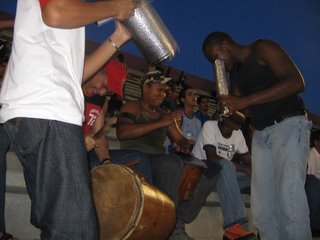
A few weeks ago, I attended a literary convention called the Feria del Libro or 'Festival of the Book' at a private college called Universidad Cecilio Acosta (UNICA). After sitting through an hour long 'critic and author' panel discussion for an acquaintances new book, I was walking around and shmoozing with various people. The guy in the picture below came up to me and said that he overheard me saying that I was from the US. His name is Jorge, and he is a professor at UNICA. Jorge wanted me to come speak at his geopolitics class which was starting in a few minutes. After verifying with another friend that the guy was kosher and not a kidnapper, I went along. After class, we went back to his house and his Mom (everyone lives with their parants) made us ham sandwiches. Jorge is writing his thesis on Venezuela's current and future role in international events, so he is an excellent person to know. For some reason, he wanted to show me his diploma, so I took this picture.
 Here is a picture of the cabinet in the house where I have been living. Is this a sticker advertizing the radical, vegetarian left-wing of the Boy Scouts? Nah, soy means "I am."
Here is a picture of the cabinet in the house where I have been living. Is this a sticker advertizing the radical, vegetarian left-wing of the Boy Scouts? Nah, soy means "I am." I took this picture while sitting in the back seat of a Carrito (one of the taxis that follows a proscribed route). The type of house in this picture is an old-style Maracucho house called a Saradillo. Saradillos are most common in a district called Carabobo which is close to the city center. It was hot, so I was surprised to see this guy sitting in his rocking chair between the houses.
I took this picture while sitting in the back seat of a Carrito (one of the taxis that follows a proscribed route). The type of house in this picture is an old-style Maracucho house called a Saradillo. Saradillos are most common in a district called Carabobo which is close to the city center. It was hot, so I was surprised to see this guy sitting in his rocking chair between the houses.

So that's all for now. Tomorrow I am moving to my new apartment which is near a popular street called Cecilio Acosta. I am also going to be supervising two poetry slams in upper level English conversation classes at the school where I work. More about that next time. Saludos desde Maracaibo.
Thursday, September 21, 2006
Exploring Maracaibo

Below is another work at the art exhibition at MACZUL. I was not permitted to use my flash when photographing it, but you should be able to get an idea of the contents. It is a sort of collage with pictures of American flags and presidents (mostly Bush) superimposed on pictures of dead people, bombs, Hitler, etc. People's opinions about the US seem to vary a lot here. I was talking to a cab driver the other day about Bush and the USA. The man told me that he thinks Bush is an evil man. "What do you think about Americans, then?" We had arrived at our destination by this time, but I stayed in the car to listen. His feeling was that most Americans are good people, but that we do bear some responsibility for electing our President. I think this is how many Venezuelans feel.

Going along with the comparing-things-to-Hitler theme, this is a tag that I have seen on a bunch of walls throughout the city. In case you can't see it, it is a Jewish star and a Swastika linked by an equals sign. I talked about this image with a friend of mine who is a Venezuelan history professor at a local University. He told me that there is a popular book out right now that compares the tactics of Israel against the Palestinians with those of the Nazis against the Jews. My professor friend told me that this image is anti-Israeli rather than anti-Jewish, but I'd imagine that it's quite easy to confound the two. Suffice to say that I need to be very selective as to whom I tell information about my background.

This is a picture taken at the base of a large cross in the courtyard of the Catholic Church attended by the Peruvian family with whom I live. At the beginning of the service, the Priest welcomed me very warmly to their community. Sra. Socorro, the Peruvian grandmother, told me that they have a reinforced room on the second floor of one of the buildings in the Church complex where they are planning to go if the apocalypse comes. I won't tell you the location of the Church, just in case.

This is a picture of the exterior of a very sumptuous and expensive motel on the outskirts of Maracaibo called "The Aladdin." In Venezuela, the word motel has a very different meaning than it does in the US. Here, a motel is a hotel that people go to to have sex. This is a vital service in a country where most people live in the same house with their conservative, Catholic parents. A taxi driver spent several minutes listing the names of all of the motels he could think of in the Maracaibo metropolitan area. There are A LOT. You can rent rooms on the weekend for as short as one hour, though I'd imagine that proper romance demands at least an hour and a half.
 Here I am in front of one of the longest bridges in the world, called El Puente Rafael Urdaneta. It is 8.7 kilometers long from end-to-end. When I drove across it, there was a rainstorm that began abruptly in the middle of the bridge and nearly stopped traffic on the opposite shore of the bridge. On the return trip, the rain stopped again at exactly the same spot.
Here I am in front of one of the longest bridges in the world, called El Puente Rafael Urdaneta. It is 8.7 kilometers long from end-to-end. When I drove across it, there was a rainstorm that began abruptly in the middle of the bridge and nearly stopped traffic on the opposite shore of the bridge. On the return trip, the rain stopped again at exactly the same spot.
Here I am on my first night out in Maracaibo. Really loud Salsa music was playing. The gentleman sitting to the left of me is Jorge, the Vice-consul of Columbia in Venezuela, who is in charge of the Maracaibo office of the Colombian embassy. His wife took the picture. The people to the right work for the UN office for refugee aid. I have a big smile on my face because I am drunk off of Solera Verde, a popular Venezuelan brew. These are good people.
This is a picture taken from the inside of a carrito or porpuesto. These little cars are taxis that follow a very specific route just like a bus. Carritos became popular after a series of bus driver strikes and mismanagement of the mass transit system. Some of these vehicles have holes in the floor plugged up with cardboard; on entering, one is told to step carefully. A long ride costs about 45 cents, a short one about 25 cents. Written on the piece of cardboard held in the drivers left hand is the route this carrito follows - in this case Bella Vista. The cardboard also serves to deflect wind onto the sweaty head of the driver as many carrito's are not outfitted with a functional air conditioners. The piece of fabric on the drivers left arm protects him from sun burn.
One last story before I go. There is a word here that means 'stuff, junk.' The word is macundales, which is pronounced in Spanish mack-oon-dah-lace. This word has a very interesting etiology. Apparently, there was a large American shipping company called
"Mack & Dales" that used very solidly constructed wood boxes. In this country, people don't just throw out a good wood box - they recycle it as a storage bin. Because people used these boxes to store a wide variety of items, the name "Mack & Dales" became associated with general junk you put in a box. So clear your macundales off the table, we're about to eat dinner! Ciao, amigos. Estais en mis pensamientos.
Wednesday, September 13, 2006
Maracuchos
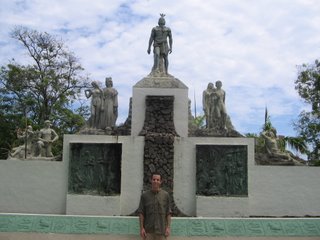 The people in this picture were hanging around under an awning. The guy sitting in the orange chair carried a satchel with various brands of cellular phones in it and you could pay him some money to use them for an agreed upon period of time. This guy is said to work in the 'informal sector,' meaning that he doesn't have a job with an established, tax-paying company. About half of the people in Venezuela survive by working in this sort of cottage industry.
The people in this picture were hanging around under an awning. The guy sitting in the orange chair carried a satchel with various brands of cellular phones in it and you could pay him some money to use them for an agreed upon period of time. This guy is said to work in the 'informal sector,' meaning that he doesn't have a job with an established, tax-paying company. About half of the people in Venezuela survive by working in this sort of cottage industry.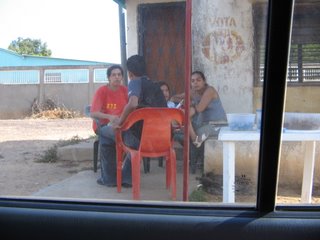 This is a view of the street in the district where I have been living. The neighborhood is called "Barrio Nueva Via." I live in the house with the awning that can be seen at the far right of the photo, behind the blue car. The neighborhood is an ethnic mix, with people of many South American nationalities living together. Most people here live with their entire extended family under one roof. Lots of people work construction when they can get jobs or scratch out a living in the informal sector. The young men play soccer in the street a few nights a week. It's a pity I suck at soccer - my bro Dan would be well suited to live here.
This is a view of the street in the district where I have been living. The neighborhood is called "Barrio Nueva Via." I live in the house with the awning that can be seen at the far right of the photo, behind the blue car. The neighborhood is an ethnic mix, with people of many South American nationalities living together. Most people here live with their entire extended family under one roof. Lots of people work construction when they can get jobs or scratch out a living in the informal sector. The young men play soccer in the street a few nights a week. It's a pity I suck at soccer - my bro Dan would be well suited to live here.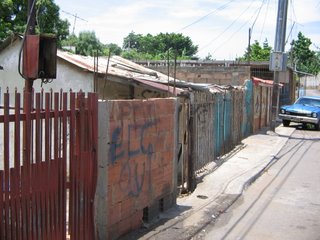
This is a picture of the hallway inside of the house where I live. The doorway to the right leads to my room, which has its own bathroom and AC unit! The lady in the background is Sra. Socorro, who is the wonderful grandmother of the house. Her husband Sr. Tito also lives here, along with two of their children, and two granchildren. They are Peruvian, so they know how it feels to be tranplanted to the foreign Maracucho culture. They feed me good food three meals a day. I am borrowing Sra. Socorro's cell phone for the next ten months because she hates it and is generous. This family has told me where and what to eat and drink and where it is safe to go during the day at night; they have taught me how to navigate around the city; they teach me vocabulary constantly. Without them, my experience in this new place would be far poorer.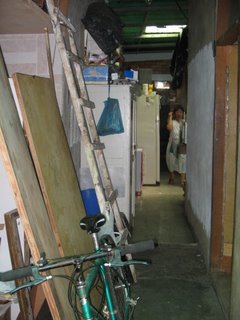
This is a picture of me with a 105 year old woman named Sra. Martina who lives four houses down from the Peruvians. She claims to be 108, but her son-in-law told me otherwise. She was born in a city called San Joaquin in Falcon State, Venezuela in 1901. She is a poet and has published several books of devotional catholic poetry. Her favorite topic is the famous Saint of Maracaibo, La Chinita. Sra. Martina can still hear, though she is largely blind. She recited some of her poetry for me from memory. She spends her days sitting in front of a fan in her bedroom remembering poetry and moving a worn string of rosary beads through her hands. Sra. Martina insisted on standing for the photograph.
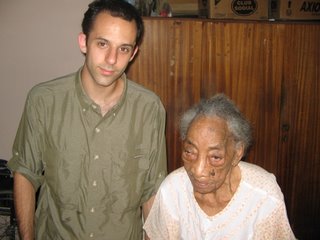
This is Emeka from Nigeria. I met him through a co-worker at CEVAZ (the binational center where I work). He too was looking for an apartment, so we met up to see if we could find a place to split. He found a place during our search, but it only had room for one person. In the course of our time together, he told me some of his story. Emeka came here 10 months ago, planning to stay for a brief time before securing a Visa to Canada. Unfortunately, he got mugged almost immediately after arriving and lost nearly everything. He was forced to live in a very bad part of Maracaibo until he found a decent job working at this Arab restaurant. He told me that he had to fight off muggers nearly every night where he was living, so he was extremely relieved when he found a new place to live. Emeka went out of his way to help me find my own apartment. He understands painfully well how tough it can be to survive in this country. He told me that he wants there to be people here who can vouch for his goodness, and he hoped that by helping out others, word would spread that he is a good man. Thus did a Nigerian stuck in Venezuela explain his own theory of Karma.
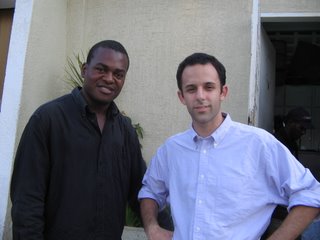
One of Emeka's friends was supposed to come pick me up at the Arab restaurant where Emeka works at 6:00 PM to take me to an excellent apartment available for rent. In typical Maracucho fashion, the guy was one, two, three hours late and ended up not showing up at all. During my wait, I wrote a poem. I started talking to some of the employees at the restaurant, and this guy, Victor, had an interest in poetry. He spent an hour edting my poem and he taught me a bunch of cuss words in Maracucho. I would write them here with translations, but the words are really quite rude. If you want to hear them, ask me, and I will cuss you out in Maracucho.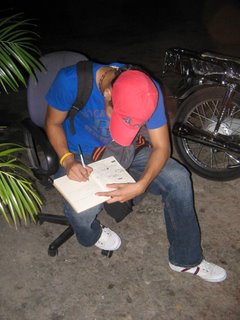
Loitering right near Victor was this guy, Daniel, who is a Guajiro Indian who works at a club across from the restaurant where I was hanging out. We talked about medicinal plants. He told me that it is possible to make a medication of the ground leaves of the plant to his right to help cure headaches. The flowering plant immediately behind him is good for the stomach. The plant above him and to the left is not native or he did not know what it was useful for. Daniel said that he knows the uses of around 60 common plants, but that there are other people who know thousands. He lives in Maracaibo, as do many other Guajiro, but he has relatives who live in the forest along the porous border with Colombia.
That's all for now. Next time: an art show, some offensive graffiti, a drunken night out with the vice-consul of Colombia, a Catholic mass, and whatever other odd things happen to me between now and the next post. I miss you all.
Sunday, September 10, 2006
Caracas
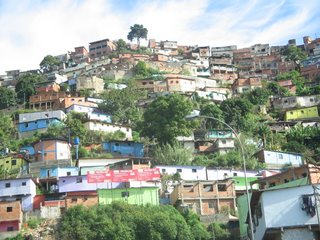
This is a picture of the bridge that used to lead from the regional airport to Caracas. You can see in the background the old bridge that fell into the ravine. The new bridge is being built in the foreground, and they have been working on it for about 3 years but only have one column done. Thus, everybody is forced to take a winding bypass that is perpetually backed up. This is choking the economy of the capital.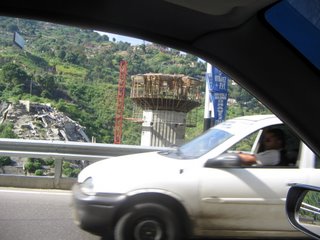
I took this picture when taking a walk around our neighborhood, a rich district called Las Mercedes. Electric fences are common and the walls below them are strong, high, and topped with razor wire, pointy metal, or broken glass.
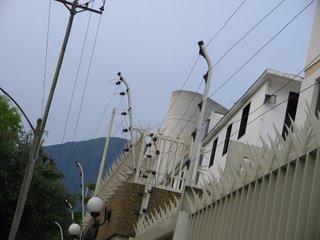 On the same walk through this densely populated area, we came upon this huge golf course. This is like putting an 18 hole course in the middle of Washington, DC or New York city. "El Presidente" has recently made campaign promises to take control of the golf courses and use them to build housing for the poor. The courses are surrounded, like everything, by 20 foot fences topped with barbed wire. We only got in because someone left a gate open. There is such inequality here.
On the same walk through this densely populated area, we came upon this huge golf course. This is like putting an 18 hole course in the middle of Washington, DC or New York city. "El Presidente" has recently made campaign promises to take control of the golf courses and use them to build housing for the poor. The courses are surrounded, like everything, by 20 foot fences topped with barbed wire. We only got in because someone left a gate open. There is such inequality here.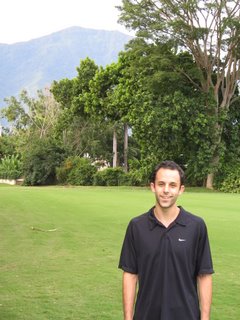 These are the other two Fulbright ETA's posing by a huge tree in the golf course. The guy on the left is Adam, who is in the beautiful, temperate, mountain town of Merida. The guy on the left in Patrick, who is teaching in Caracas. These guys are awesome.
These are the other two Fulbright ETA's posing by a huge tree in the golf course. The guy on the left is Adam, who is in the beautiful, temperate, mountain town of Merida. The guy on the left in Patrick, who is teaching in Caracas. These guys are awesome.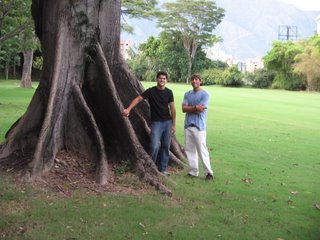
This is a billboard promoting the government of "El Presidente." There are presidential elections in 12 weeks. I'm staying out of it.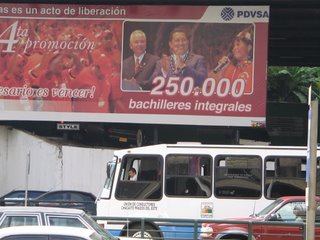
This is Caracas' mountain, El Avila. Caracas itself is about 3000 feet above sea level. The mountain is 9000 feet at the summit. It is awesome and huge and filled with exotic plants and animals - sloths, spiders!, howler monkeys, the occasional big cat. I was all set to hike to the top with Patrick and Adam when...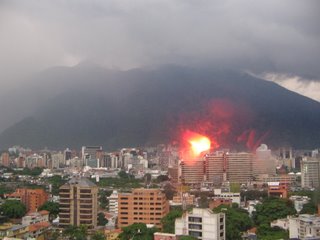
Hey! Travellers diarhea! I had the taxi driver pull over on the way to El Avila at McDonalds. This is a picture of the inside of the stall. It was great. I missed the hike, but I will make in the future.
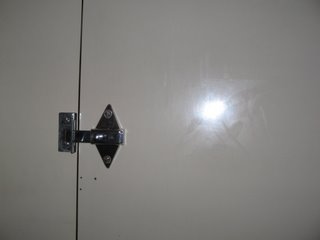 That's all for now. Feel free to post your thoughts, responses, or mean-spirited insults below. I miss and love you all.
That's all for now. Feel free to post your thoughts, responses, or mean-spirited insults below. I miss and love you all.


